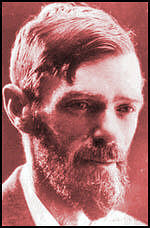


December 1912
Intimations of Coming Armageddon
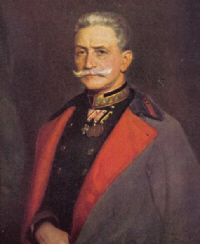 Conrad von Hötzendorff
|
Call it hindsight or "Monday morning quarterbacking," but it sure looks like December 1912 had a number of signals impending peril that should have alarmed the governing classes in Europe. On 2 December
German Chancellor Theobald von Bethmann- Hollweg told the Reichstag in a speech that Germany would go to war if Austria-Hungary was attacked by any other nation as a matter of defending Germany's future and security. A few days later Kaiser Wilhelm met with his military leaders and reportedly speculated on the inevitability of war with Russia and the prospect of facing a Russian-French and British coalition. The very next day (9 December) unrepentant war advocate Conrad von Hötzendorff returned to influence as Austro-Hungarian minister of war and the empire's military forces were almost immediately mobilized in response to the turmoil in the Balkans.
If the politicians missed these portents, not everyone did. At the end of the month Russian poet Alexander Blok felt the gloomy future:
|
Now at this hour of dejection
Like magic, firmly, desperation
Dismays me filling me with remorse. . .
|
|
TRENCH REPORT: Happy holidays and best wishes for the new year to all our readers. . .Forgive me now, but I need to make one of my periodic appeals for funding support to you. I have made this monthly newsletter available for free for a decade. I'm sure you appreciate it takes a lot of time to research and produce each issue. I justify the this commitment by marketing my monthly subscription magazine OVER THE TOP in these pages. If you like the Trip-Wire, I know you will enjoy the magazine and hope you can find a way to add a subscription. I only charge $25 for 12 issue and very reasonable amounts for our annual CDs of past issues. Below in this column you will see our next cover. You can click on it to download our lastest brochure. I hope you will take a look it over and decide to support us. MH
News from the World War One Historical Association
Click on Title or Icon to Access
|
How Did a European War Become a World War?
The WW1HA ventures forth where "angels fear to tread." Read our article on one of the biggest historical mysteries associated with the Great War. (link)
2013 Events
The WW1HA New York - New England Branch
2013 Annual Seminar
16 March at the Vassar College Alumnae House in Poughkeepsie, New York. Click here for details: (link)
The League of World War I Aviation Historians Has Announced Their 2013 Seminar
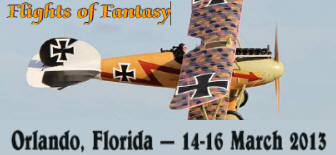 Click on Image to Download Event Flyer
Click on Image to Download Event Flyer
|


Site of the 1914 Christmas Truce, Flanders
Scots and Huns were fraternizing in the most genuine possible manner. Every sort of souvenir was exchanged, addresses given and received, photos of families shown, etc. One of our fellows offered a German a cigarette: the German said, "Virginian?" Our fellow said, "Aye, straight-cut:" the German said, "No thanks, I only smoke Turkish!"
Captain Sir Edward Hulse, 1914 Letter
|
Happy Holidays for 2012
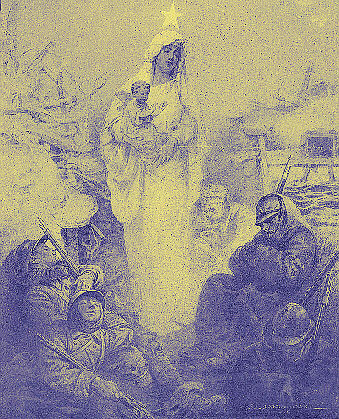 From La France Illustreé, December 1916
From La France Illustreé, December 1916
This Month's Internet Feature
The Nivelle Offensive and Subsequent Mutinies of 1917
The Second Battle of the Aisne River was intended by its instigator General Robert Nivelle to be a war-winning decisive breakthrough. Instead it demoralized the French Army and eliminated it as an offensive force for over a year.
Overview of the Offensive
Bavarians on the Aisne (German Point of View + helpful map)
Biographical Sketch of Robert Nivelle
Details on the Mutinies
YouTube Video La Chanson de Craonne, the Tragic Song Composed in the Aftermath of the Battle
News Account of 90th Commemoration of the Mutiny
Album of Postal Cards with Images of the Battlefield
Download an Outstanding WWI 16x11 inch Poster
The New 42nd Rainbow Division
Croix Farm Monument
The monumental bronze statue of an American soldier carrying his dead comrade depicted is the work of British artist James Butler, RA. It was dedicated in November 2011 on the site of a battle that took place on 16 July 1918, in the vicinity of Fère-en-Tardenois, during the Aisne-Marne offensive. There, one regiment of the 42nd "Rainbow" Division, the 167th (Alabama) Infantry Regiment, overran German positions in and around the fortified Croix Rouge farm, pushing them to the other side of the Ourcq river and contributing to the liberation of the Château-Thierry salient.
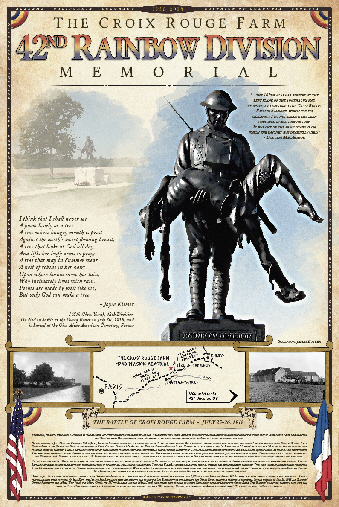
Click on Image to Download (9 megs)

Evidence of an Accelerating Interest in the Great War
According to Jay Winters and Antoine Prost the number of volumes that were catalogued in the British Library under the subject "The World War, 1914 to 1918" quadrupled between 1980 and 2001.
|
|
Page Two
|
|
|
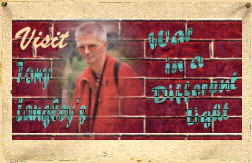
Antwerp 1914
Christmas Packages for the Occupation Forces
Jolly-looking German occupation troops march down one of Antwerp's main boulevards bearing Christmas packages from home in December 1914. The onlooking local citizens have not yet fully appreciated the price of being occupied. Food shortages, forced labor and the agitation of Belgium's Flemish-Walloon division are just over the horizon.
TL
|

Click here to read a more about the German occupation of Belgium.
|
|
|
Monash at Gallipoli
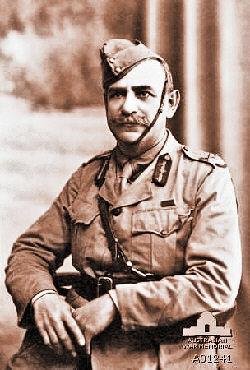
Monash: General in the Making |
Sir John Monash (1865-1931) commanded Australian troops during some of World War One's most famous battles. He gained a reputation as a great military planner and strategist, which led to battlefield victories in France and Belgium and a knighthood. These successes, however, were preceded by the terrible defeat suffered by the Australian and New Zealand forces under British command at Gallipoli, Turkey.
Monash was a most unlikely Digger hero. Of Prussian-Jewish extraction, cultured, fussy, an organized and methodical disciplinarian to the point of obsessive, he was a middle-aged overweight citizen soldier with no active war experience when hostilities broke out in 1914. Yet he was the leader Australian soldiers needed both during and after the war. At Gallipoli he commanded the 4th Australian Infantry Brigade,
During the initial Gallipoli landing the 4th Brigade was in reserve. Monash did not land until the morning of 26 April and was given the left-centre sector including Pope's Hill and Quinn's Post to organize while the Turks counterattacked. His brigade was still not fully gathered by the 30th, but Monash had an orderly conference of his battalion commanders that day. The night offensive on Baby 700 of 2 May, which Monash had opposed, was disastrous; according to Charles Bean it left him "unstrung, as well it might." The brigade played its part in withstanding the Turkish offensive of 19 May and the break-in to Quinn's on the 29th, and was relieved from the line at the end of the month.
In July Monash learned of his tardy promotion to brigadier general at a time when wild rumors were circulating in Cairo, London, and Melbourne that he had been shot as a German spy and traitor; there had been a similar vicious whispering campaign in Melbourne the previous October. The brigade now prepared for the battle of Sari Bair and its part in the left hook on Hill 971. Their night march of 6 August was delayed and a vital wrong turning made. Monash forced himself to the front, punched his battalions into position, and made good progress against moderate resistance. But the maps were faulty, the men were lost and exhausted and next morning could only dig in. On the 8th, after attacking, they had to withdraw. Most of the men were sick, many had paratyphoid. The remnants then took part in the unsuccessful attacks on Hill 60, before being withdrawn to Lemnos. Monash had three weeks leave in Egypt.
The brigade returned to a quiet sector on Gallipoli. On the final night of the evacuation Monash was not one of the last to leave, but rashly sent home an illegal diary-letter implying that he had been. Gallipoli had given him a devastating education. Bean, Birdwood, and others left an impression that his performance had been mediocre; but his brigade had performed at least as well as any of the other three and he had little or no part in the battle plans he had to attempt to carry out. His performance on 7-8 August is open to criticism, but it came to be recognized that the attack on Hill 971 was totally impossible to accomplish. Bean reported the saying that Monash "would command a division better than a brigade and a corps better than a division."
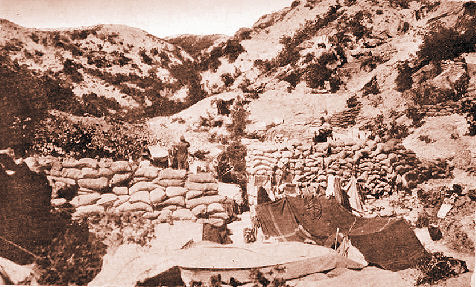
Monash Gully: Anzac Sector, Gallipoli
Sandbag Barricades Are Protection Against Turkish Snipers on the Ridge
Monash found out the hard way—in battle—many lessons. For one thing, he was very overweight, and this wasn't a war in which to be overweight. He found he could not fit through some of the trench tunnels. With the withdrawal from the Turkish peninsula, Monash and most of the Australian forces were sent to France. After arriving, he reflected on the differences of the Western Front from Gallipoli:
The question of getting hurt [on the Western Front] is in no sense a question of taking any special precautions. At Anzac the principal danger was from sharpshooters, and one had to learn the dangerous spots and how to circumvent them. Shellfire was of little danger only because it was so little in quantity, not because it did not reach every part of the area of one's perambulations. Here, there is practically no danger at all from rifle or machine-gun fire. The danger from artillery fire is greater only because there is more of it, and one can say with definiteness that there is no spot within the area of one's daily movements which is really safe. It is merely a question of coincidence of a shell and oneself being simultaneously at one and the same spot. Experience has shown that it is quite futile to try and dodge shellfire; one is just as likely to run into a beaten zone as out of it. There is no spot in the whole sector which may not, conceivably, be shelled.
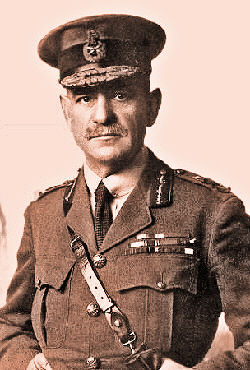
Monash: Consummate Commander |
They thought after Gallipoli the fields of France would be a picnic. They were wrong. The reality of industrialized warfare became apparent—mile upon mile of trenches, barbed wire, mud, and extraordinarily heavy artillery. Through many trials and errors, the Australian divisions were starting to become the hardened, intelligent fighting force which would prove so effective by 1918, when Monash and the AIF (Australian Imperial Forces) played a crucial role in defeating Germany on the Western Front.
After the war, when Monash and the AIF returned home to relative neglect, Monash strived to ensure soldiers received due honor, recognition, and assistance. As part of his campaign he played a pivotal role in creating Anzac Day commemorations. Without Monash, this annual commemoration would most likely have faded into obscurity.
Sources: Australian Biography, Australian War Memorial, Australian History Websites
|
|
My World War I Expeditions for Valor Tours, Ltd.

Click on Image to Send Email
|
World War I Headlines
in the 21st Century
|
|
Page Three
|
|
|
|
What Did Houdini Do During the Great War?
|
The title of this new feature, "What Did Houdini Do During the Great War?" was first uttered by my very good friend Donna Wagner when the great escape artist was mentioned during an evening of our TV viewing. When I was stumped for an answer, Donna got to work and came up with the details below. Now, whenever we hear the name of someone interesting from the era, a new round of research is triggered. We have now gathered information on number of subjects. As the saying goes, "This might be the start of something big."
Harry Houdini (1874-1926)
Magician & Escape Artiste

Houdini with Soldiers, Jennie the Disappearing Elephant,
and Selling Liberty Bonds
The Great Houdini was a great patriot. When the United States entered World War I in 1917, Houdini tried to enlist in the army, but at age 43 was rejected as being too old. He then volunteered to teach soldiers how to escape from restraints and joined the celebrities who helped sell Liberty Bonds to fund the war effort. Houdini was credited with selling over $2 million worth. But it was as an entertainer that he made his greatest contribution in building the nation's morale. Houdini preformed many free shows for service men, during which he would produce five-dollar gold pieces from the air and toss them to the audience as souvenirs. He claimed to have distributed more than $7,000 in that manner. He also starred in a patriotic review at the New York Hippodrome called Cheer Up. It was in this review that he first made Jennie the Elephant disappear. At a second review, Everything, he produced an eagle named Abraham Lincoln from the folds of an American flag. His Masonic Lodge brethren produced a wonderful summary of his war work. (link)
Bela Lugosi (1882-1956)
Soldier and Actor
Born Bela Ferenc Dezso Blasko in Lugos, Banat, Austria-Hungary (now Lugoj, Romania), the man we remember as Bela Lugosi was the youngest of four children of a banker. Just after the turn of the century, he started his career on the stage in mostly secondary roles in Hungary. When World War I broke out, he became an infantry and ski-patrol officer in the Austro-Hungarian Army, being wounded three times and decorated for his service on the Russian front. He also lost his first wife during the war. In 1919, after finding himself on the losing side of the Hungarian Revolution, he moved to Germany to perform in postwar German cinema. Following the death of his second wife, he emigrated to the U.S. Between acting gigs, while working as a laborer, Bela was spotted for the lead in a stage version of Dracula. His memorable career as a film icon soon followed. I found an interesting video archive of of interviews he conducted over the years here:
(link)
D.H. Lawrence (1885-1930)
Author
How would a gifted novelist, repelled by industrial society and attracted to the glories of the natural world and the liberating qualities of sexuality respond to the industrialized, countryside-destroying, dehumanizing character of the Great War? Not well at all. During the First World War the vocally antiwar D.H. Lawrence and his German wife, Frieda (a cousin of Manfred von Richthofen), were unable to obtain passports to leave England and were targets of constant harassment from the authorities. Twice called up for service, Lawrence (fortunately for him and for literature) was rejected for health reasons on both occasions. He managed during the war nonetheless to complete both The Rainbow (an early target of obscenity charges) and Women in Love, which was not published until afterwards. The couple was eventually accused of spying for the Germans and officially expelled from Cornwall in 1917 under the Defence of the Realm Act. At war's end, he barely survived a bout of influenza. The Lawrences were not permitted to emigrate until 1919, when their years of wandering began. Consistently true to his beliefs, toward the end of his life he summed up his philosophy nicely: "For man, as for flower and beast and bird, the supreme triumph is to be most vividly, most perfectly alive." His old college, the University of Nottingham, has an excellent summary of his war years. (link)
|
Remembering Sgt. Edwin Beach, USMC,
6th MG Battalion, 2nd Division
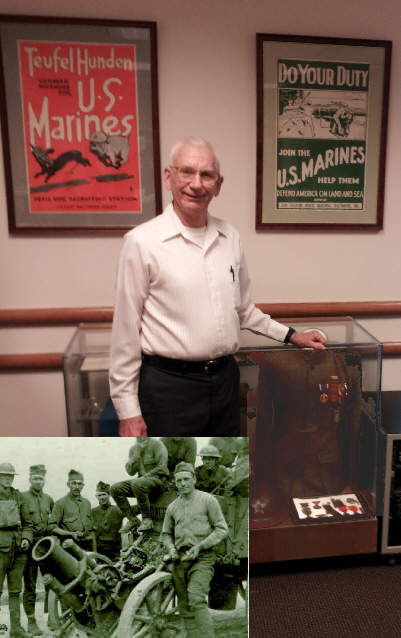
|
Naturally, the Marine Corps University at Quantico, Virginia, needed to include an authentic uniform from the World War I period in their collection of historic artifacts. The war was one of the proudest chapters in Marine Corps annals. The uniform eventually chosen for display in the archives of the university, shown on the left, was contributed by Trip-Wire reader Jerry Beach. It was issued to his father, Edwin. As you can see, Jerry is very proud of his dad's service as a machine gunner with the Marine Brigade.
Sgt. Edwin Beach (shown below Jerry holding two fuses for the captured German minenwerfer) got to France in February 1918 and managed to survive Belleau Wood, Soissons, St. Mihiel, Blanc Mont, and the last phase of the Meuse-Argonne Offensive. After occupation duty he returned home to Ohio in September 1919.
The uniform itself survived being taken apart for other uses, a last-minute reprieve, and a long time in storage, before Jerry had it restored and dedicated along with Edwin's medals to a new round of service with the United States Marine Corps.
|
|
|
 |
A Fresh Look at an Old Issue
The Zimmermann Telegram: Intelligence, Diplomacy and America's Entry into World War I
Reviewed by Len Shurtleff
|
Author Thomas Boghardt is senior historian at the U.S. Army Center for Military History. In this new, well documented and closely argued text, he draws on documents not available at the time Barbara Tuchman's classic work was written in 1957, taking a fresh look at the Zimmermann fiasco. Boghardt expertly dissects the political and military situation surrounding the decrypt ion and dissemination of the notorious Zimmermann Telegram which triggered (but was not the cause) America's entry into the Great War. Of equal importance are his brief but revealing character sketches of the principal actors in the drama: German Foreign Secretary Arthur Zimmermann, British naval intelligence chief, William "Blinker" Hall, Wilson confidant Colonel Edward House, and U.S. Secretary of State Robert Lansing among many other major and minor characters.

Arthur Zimmermann |
The disastrous decision to dispatch the telegram was taken by Foreign Secretary Zimmermann without reference to the German chancellor, the Kaiser, or the German general staff. Zimmermann's action was typical of the dysfunctional German federation, which lacked a central policy-making body. Moreover, the Foreign Ministry failed to investigate carefully the circumstances surrounding disclosure of the telegram. Zimmermann preferred to scapegoat German ambassador Henrich von Bernstorrf and the German embassy staff in Washington rather than admit to a rather obvious breakdown in cryptographic security. Thus, this leak was never sealed. Unlikely as it seems, Zimmermann, an experienced diplomat, and his staff were woefully ignorant of political forces at work in America, Mexico, and Japan. Thus, these abortive German efforts to get Japan (a British ally) and Mexico (then in the throes of a civil war) to attack the United States had no chance of success.
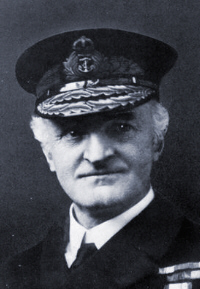
Adm. Sir Wm. Reginald
"Blinker" Hall |
For his part, U.S. Secretary of State Robert Lansing effectively covered up the true provenance of the Zimmermann decrypt ion. Like Wilson's diplomatic confidant and emissary Colonel House, he favored American entry into WWI on the side of Great Britain and saw Zimmermann's rash and ill-informed gambit as decisive in this regard. In fact, however, the telegram only served to further polarize factions of American pacificists and interventionists. Despite the Zimmermann provocation U.S. public opinion remained sharply divided on the subject of belligerency. Wilson knew this and took extraordinary measures to excite war fever and crush antiwar sentiment. In addition to sanctioning superpatriotic leagues like the National Security League and the American Defense Society, the Post Office Department suppressed antiwar and pacifist publications and the Attorney General prosecuted and jailed antiwar activists such as socialist labor leader Eugene Debs. Wilson also hired publicist George Creel to head up the Committee on Public Information, the official administration propaganda outlet that churned out millions of pages of newsprint and sponsored hundreds of speakers in support of U.S. participation in the conflict.
Finally, the author uses the role of British naval intelligence in interception, decrypt ion, and disclosure of the Zimmermann Telegram to highlight the growth of powerful intelligence services engendered by total war and largely independent of responsible political control. British naval intelligence chief "Blinker" Hall took it upon himself to leak the telegram to the Americans without reference to the Foreign Office. The growth of MI5 and other powerful and freewheeling intelligence services patterned on Hall's successful spy enterprise (and its famous Room 40) survived into the postwar period and flourish today.
The Zimmermann Telegram: Intelligence, Diplomacy and America's Entry into World War I, Thomas Boghardt, US Naval Institute, Press, 2012, ISBN 978 16125 1148 1.
|
|
|
|





 From La France Illustreé, December 1916
From La France Illustreé, December 1916













